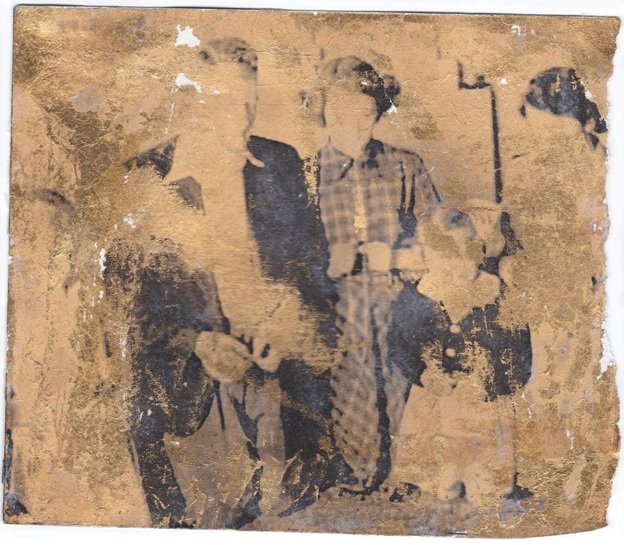I ladle piping hot apple butter into a sealer, hand it and a wooden chopstick to Mom and ask, “Could you get rid of the air?”
She frowns. Stabs at the centre of the jar, and in a small voice says, “How am I supposed to do that again?”
I close my eyes. Inhale. See myself standing on a stool in the small orange kitchen of my childhood. Maman places a warm sealer onto the Formica countertop and says, “On doit se se débarrasser des bulles d’air, ma chérie.” We chase the bubbles from behind the cucumbers polka-dotted with mustard seeds. Things were simpler when I was the little girl and Maman filled me until I brimmed with lessons she’d learned from her mother.
I want to dislodge the gaps in her memory. Instead, I take the jar from her hand. Ease the chopstick around the inner contours of the jar. Say, “Like this. You taught me how to do this. You said, ‘We can’t get a seal if we’ve got air.’” It seems neither of us knows what to say next.
When Mom goes to bed, I call my son. Tell him I went a bit overboard with the cloves. Admit to being short-tempered with Granny.
He says, “For a smart person, you’re not very smart.” Explains: She won’t always be like she was. Her concussion, the radiation, the chemo—all change brain chemistry.
Of course, I already know all of this. I’m just not ready to accept our changing roles. Will she forget each detail she once deemed important enough to teach? Will I bring her back to the orange kitchen—ask her to climb onto the stool, point out the cushions of air between the pickles?
Mom goes home the next day after her medical appointments.
I want to throw myself onto the floor, flail my arms and legs, pull at my hair. Yell, “Sometimes I just want to be the kid!” The one being taken care of. I want to throw a temper tantrum because Mom is sick. I can’t imagine losing her.
Instead, I stand in the middle of my kitchen and take inventory of what needs doing. It was Mom who taught me to suffocate worry with work. I carry the cooled jars of preserves into the basement. Bring order to my pantry shelves before I tackle the next batch. Who knows how long the results for her biopsy will take?
As I fill the gaps along the pantry shelves, a memory of my young son and I pops into my mind. We’re unpacking groceries in our Rosthern kitchen. I say, Always put the new yogurt behind the old. Otherwise, the old one will go bad before we remember it’s there.
I rearrange my handiwork, place last year’s preserves in front of the new. Roles begin to change so subtly we hardly notice. I tidy the rows of apple butter, apple chutney, sour cherry jam, chokecherry syrup and zucchini relish. At least for now, everything is as it should be—at least in this pantry.
A week later, Mom calls when I’m half done packing pickled beets into jars. The kitchen is humid, the air sharp. I put her on speaker and continue coaxing out trapped air. Mom likes to start her stories from the beginning. She tells me again about how the mammogram detected nothing, but she insisted on an ultrasound. Apart from the bubbles fizzing at the surface, sound is suspended in the kitchen. I hold my breath and wait for her to tell me everything was negative. Slowly, she adds, “And just like I suspected, they found cancer clusters deep within the breast tissue.”
I want to scream and rant and rave because haven’t we all suffered enough?
Instead, I wipe beet brine from the counter before the stain sets—another of Mom’s lessons—and, as though on cue, the lid of the canner starts to tremble. I tell her, “The water’s boiling. How about I call back once I'm done with my beets?” I’m surprised how calm I sound. I steal a pickle from the jar, let the tears come with the tang of sweetened vinegar.
In my mind, I follow Maman down the narrow wooden stairs into the musty cellar. My fingers bump along rows of cool glass sealers: carrots & peas, stewed tomatoes, rhubarb jam, mustard beans. I linger, write my name in cursive through the thin layer of dust on a jar of giant dills while Maman restocks the shelves—her dark wavy hair sways as she bends and reaches, bends and reaches. She is the strongest woman I’ve ever known.
I shake the memory from my mind and resume jostling each jar of pickles. Bang each on the counter before I do a final sweep for bubbles. As I lower the loaded rack into the boiling bath, one of the sealers wobbles. Mom’s voice pipes up, It never hurts to double check. I pop the lid of the questionable jar and prod the contents. Sure enough, despite my elimination tactics, pockets of air cling undetected. Like cancer cells.
I want to weep, throw my hands in the air and give up.
Instead, I unload the rack, remove each lid. I’m not taking any risks. My hands, the floor and countertops bruised purple, I prep my pantry. I stand back and imagine this shelf come tomorrow—a jeweled row of mustard beans, pickled beets and dilled carrots. For now, everything is in order. I step into my new role and call Mom back.
Rachel Laverdiere writes, pots and teaches in her little house on the Canadian prairies. She is CNF editor at Atticus Review and the creator of Hone & Polish Your Writing. Find Rachel's prose in Grain, The New Quarterly, Atlas and Alice, The Citron Review and other fine journals. For more, visit http://www.rachellaverdiere.com.



















